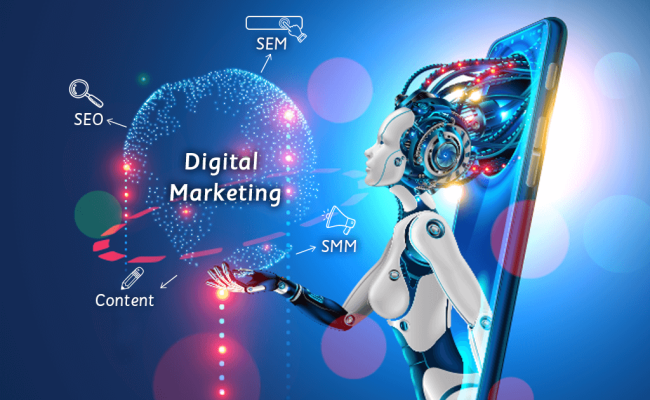In the marketing field, the rise of Artificial Intelligence (AI) is reshaping the way marketers approach their work. More than just a passing trend, AI is becoming an indispensable factor that helps businesses stay competitive.
AI Marketing Strategies and Tactics help marketers capture and analyze data accurately and automate processes. This allows them to better understand customer needs and behaviors and create more personalized and effective marketing campaigns.
AI Marketing is also changing the way brands interact and connect with their audiences. In today’s digital age, applying AI Marketing in marketing not only helps businesses reach their target customers more intelligently but also enhances customer engagement and experience with the Brand.
In today’s fast-paced digital landscape, AI Marketing has emerged as a game-changer for businesses looking to enhance their marketing strategies. By leveraging artificial intelligence, marketers can gain deeper insights, automate processes, and deliver personalized experiences to their audiences. This article delves into the world of AI Marketing, exploring its strategies, tactics, and the profound impact it has on modern marketing practices.
AI Marketing: A Modern Perspective
AI Marketing is a modern marketing strategy that uses artificial intelligence technology to provide accurate information and optimize customer interactions. In the modern market context, AI is not just a supporting tool; it has become an important part, naturally integrated into our daily lives without us even realizing it.
According to Scott Brinker, CEO of Chiefmartec, AI is the future of marketing. It has a huge impact on how we reach and interact with customers, and this impact will only expand in the future. AI helps marketers personalize customer experiences, automate processes, and measure the performance of marketing campaigns. As AI continues to develop, it will become increasingly important in helping marketers achieve their goals, from enhancing communication effectiveness to optimizing marketing strategies.

What is AI Marketing?
AI Marketing refers to the use of artificial intelligence technologies to make automated decisions based on data collection, data analysis, and additional observations of audience or economic trends that may impact marketing efforts. AI is often used in marketing efforts where speed and efficiency are crucial. Tools that utilize AI enable marketers to gain a more profound understanding of their audience’s behavior and preferences.
The beauty of AI Marketing lies in its ability to process vast amounts of data at breakneck speed, uncovering patterns and insights that would be impossible for humans to detect. By automating routine tasks, AI frees up marketers to focus on strategy and creativity, enhancing overall productivity and effectiveness.
Evolution of AI in Marketing
The journey of AI in marketing is a fascinating one, marked by rapid advancements and groundbreaking innovations. Initially, AI’s role in marketing was limited to automating simple tasks like email scheduling or basic data analysis. However, as AI technologies evolved, so did their applications in marketing.
Today, AI algorithms can analyze consumer data to predict future purchasing behavior, create personalized marketing campaigns, and even generate content. The integration of AI with other emerging technologies such as machine learning and natural language processing has further expanded its capabilities, enabling marketers to deliver highly personalized and relevant experiences to their audiences.
Importance of AI Marketing in the Modern Age
In an era where consumers are inundated with information and choices, standing out from the crowd is no easy feat. This is where AI Marketing shines. By harnessing the power of AI, marketers can deliver hyper-personalized experiences that resonate with their audience, fostering deeper connections and driving brand loyalty.
Moreover, AI Marketing empowers businesses to make data-driven decisions, optimizing their strategies for maximum impact. From predicting consumer trends to identifying the most effective channels for engagement, AI provides marketers with the insights they need to stay ahead of the curve.

Benefits of Using AI in Digital Marketing? Tactics for Marketers
A new study by Harvard Business Review shows that in the field of marketing, especially digital marketing, AI is opening up huge opportunities. This is understandable when realizing that AI is a powerful tool for personalizing products and solutions.
AI offers many benefits to marketers to stay competitive. It helps in creating personalized Content and recommendations based on customer data. Predictive analytics helps in making data-driven decisions, while chatbots and virtual assistants provide instant support, enhancing the user experience. AI-generated content also helps in saving time and optimizing ad campaigns for high ROI. In the field of Email marketing, AI helps in precise segmentation and personalization.
AI Marketing solutions, including those from AI Marketing companies in Vietnam, play a vital role in improving customer satisfaction and results. They provide cost-effectiveness, scalability, and competitive advantage for businesses of all sizes. With the ability to provide real-time information, marketers can react quickly to changing conditions and customer behavior, ensuring continued success in the digital marketing world.
Enhanced Customer Insights: One of the most significant benefits of AI Marketing is the ability to gain enhanced customer insights. AI algorithms can analyze customer data from various sources, such as social media, website interactions, and purchase history, to create detailed customer profiles. This allows marketers to understand their audience better and tailor their strategies accordingly.
Improved Efficiency and Productivity: AI Marketing tools can automate repetitive tasks, such as email marketing, social media posting, and data analysis. This not only saves time but also improves efficiency and productivity. Marketers can focus on more strategic tasks, such as campaign planning and creative development, while AI handles the routine work.
Personalized Customer Experiences: Personalization is key to successful marketing, and AI makes it easier than ever to deliver personalized experiences. AI can analyze customer data to identify preferences and behaviors, allowing marketers to create personalized content, offers, and recommendations. This leads to higher engagement and conversion rates.
Chatbots and Virtual Assistants: Integrate AI-powered chatbots into your website and Social Media channels. These tools act as a digital customer support team, providing answers and guidance to customers as they interact with your site.
Competitor Research: Use AI marketing tools to monitor and analyze your competitors’ marketing activities. It’s like having a ‘spy’ to gather important information about your competitors’ strategies.
Dynamic A/B Testing: Apply AI in A/B testing, helping you quickly evaluate variations in marketing content and determine which strategies are most effective.
Predicting Future Trends: Use AI predictive analytics to predict future customer actions. This provides important information to help you plan your next marketing strategy.
Customer Journey Mapping: Use AI Marketing to track and analyze the customer journey across different touchpoints. This helps you identify where customers are having trouble and make necessary improvements.
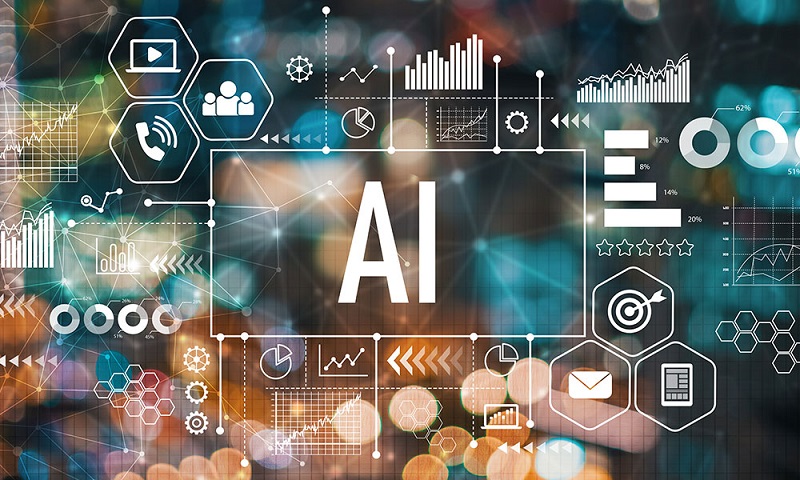
Strategies for AI Marketing
Data-Driven Decision Making: Data is at the heart of AI Marketing. By leveraging AI-powered analytics tools, marketers can make data-driven decisions that are more accurate and effective. These tools can analyze large datasets to identify trends, patterns, and insights that would be impossible to detect manually.
Customer Segmentation: AI can analyze customer data to segment audiences based on various criteria, such as demographics, behavior, and preferences. This allows marketers to create targeted campaigns for different segments, ensuring that the right message reaches the right audience at the right time.
Personalization Through AI: One of the most significant advantages of AI Marketing is its ability to deliver personalized experiences at scale. By analyzing consumer data, AI can create detailed customer profiles, enabling marketers to tailor their messages and offerings to individual preferences. This level of personalization not only enhances the customer experience but also boosts conversion rates and customer retention.
Predictive Analytics: Predictive analytics is a powerful AI-driven tool that enables marketers to forecast future consumer behavior based on historical data. By analyzing patterns and trends, AI can predict which products or services are likely to resonate with a particular audience, allowing marketers to allocate resources more effectively and maximize their return on investment.
Chatbots and Customer Service: AI-powered chatbots are revolutionizing customer service, providing instant, 24/7 support to consumers. By automating routine inquiries and tasks, chatbots free up human agents to focus on more complex issues, improving overall efficiency and customer satisfaction. Furthermore, AI chatbots can learn from interactions, continuously improving their ability to assist customers.
Programmatic Advertising: Programmatic advertising leverages AI to automate the buying and selling of digital ads, ensuring that the right ads are shown to the right people at the right time. By analyzing data in real-time, AI can optimize ad placements and bids, maximizing the effectiveness of advertising campaigns and minimizing wasted ad spend.
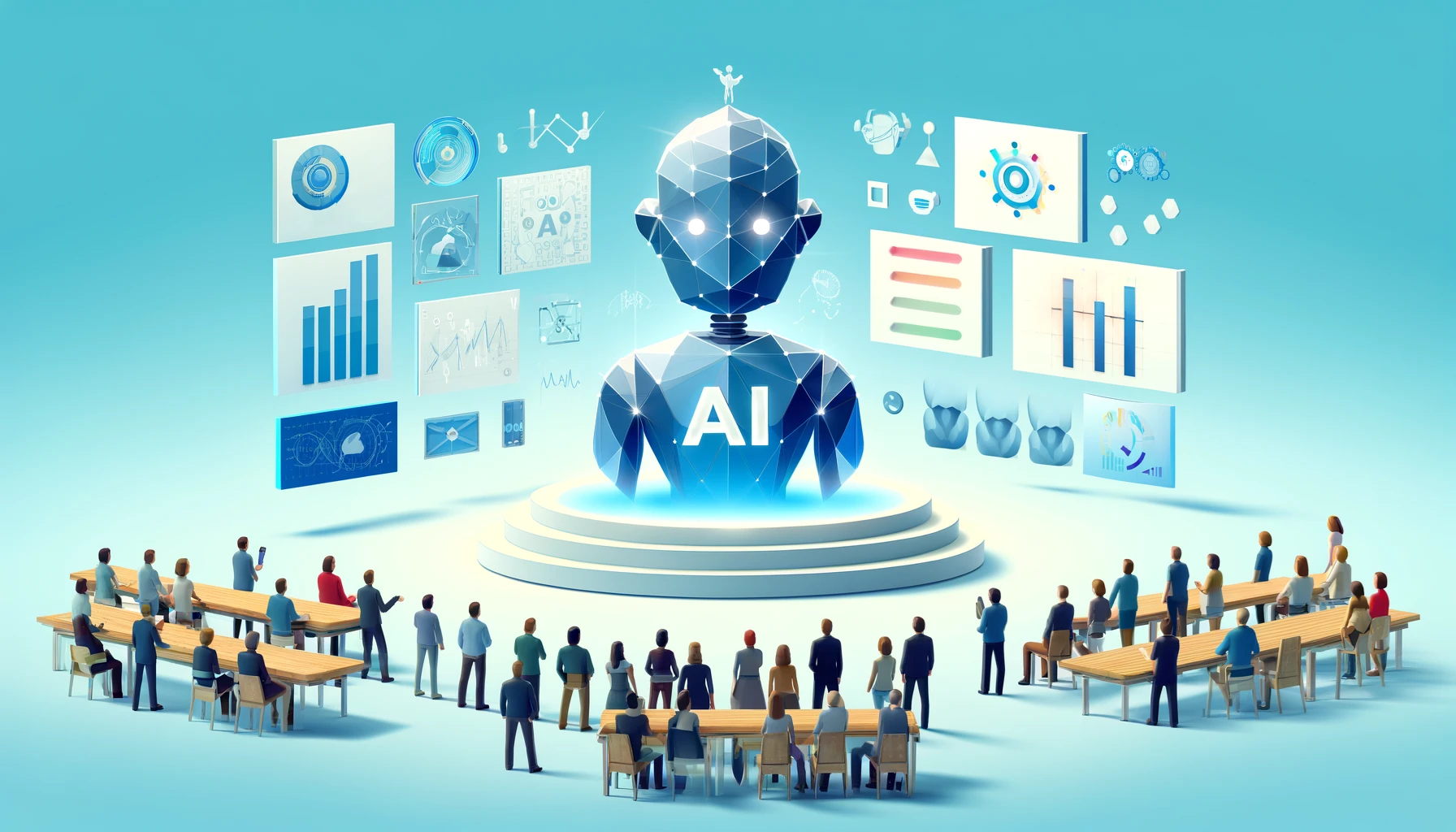
Tactics for Successful AI Marketing
Data-Driven Decision Making:In the world of AI Marketing, data is king. By leveraging AI-powered analytics tools, marketers can gain valuable insights into consumer behavior, preferences, and trends. This data-driven approach enables businesses to make informed decisions, optimize their strategies, and ultimately achieve better results.
Content Generation and Optimization: AI has the potential to revolutionize content creation and optimization. From generating blog posts and social media updates to optimizing website content for search engines, AI can automate many aspects of content marketing, freeing up marketers to focus on strategy and creativity. AI-powered tools can also analyze content performance, providing insights into what resonates with audiences and what doesn’t.
Customer Segmentation: Effective customer segmentation is crucial for delivering personalized marketing experiences. AI can analyze vast amounts of data to identify distinct customer segments, enabling marketers to tailor their messages and offerings to specific groups. This targeted approach not only enhances the customer experience but also improves conversion rates and ROI.
Automation in Campaigns: Automation is a key component of AI Marketing, enabling businesses to streamline their marketing efforts and improve efficiency. From automating email campaigns and social media posts to optimizing ad placements and bids, AI can handle a wide range of tasks, freeing up marketers to focus on strategy and creativity.
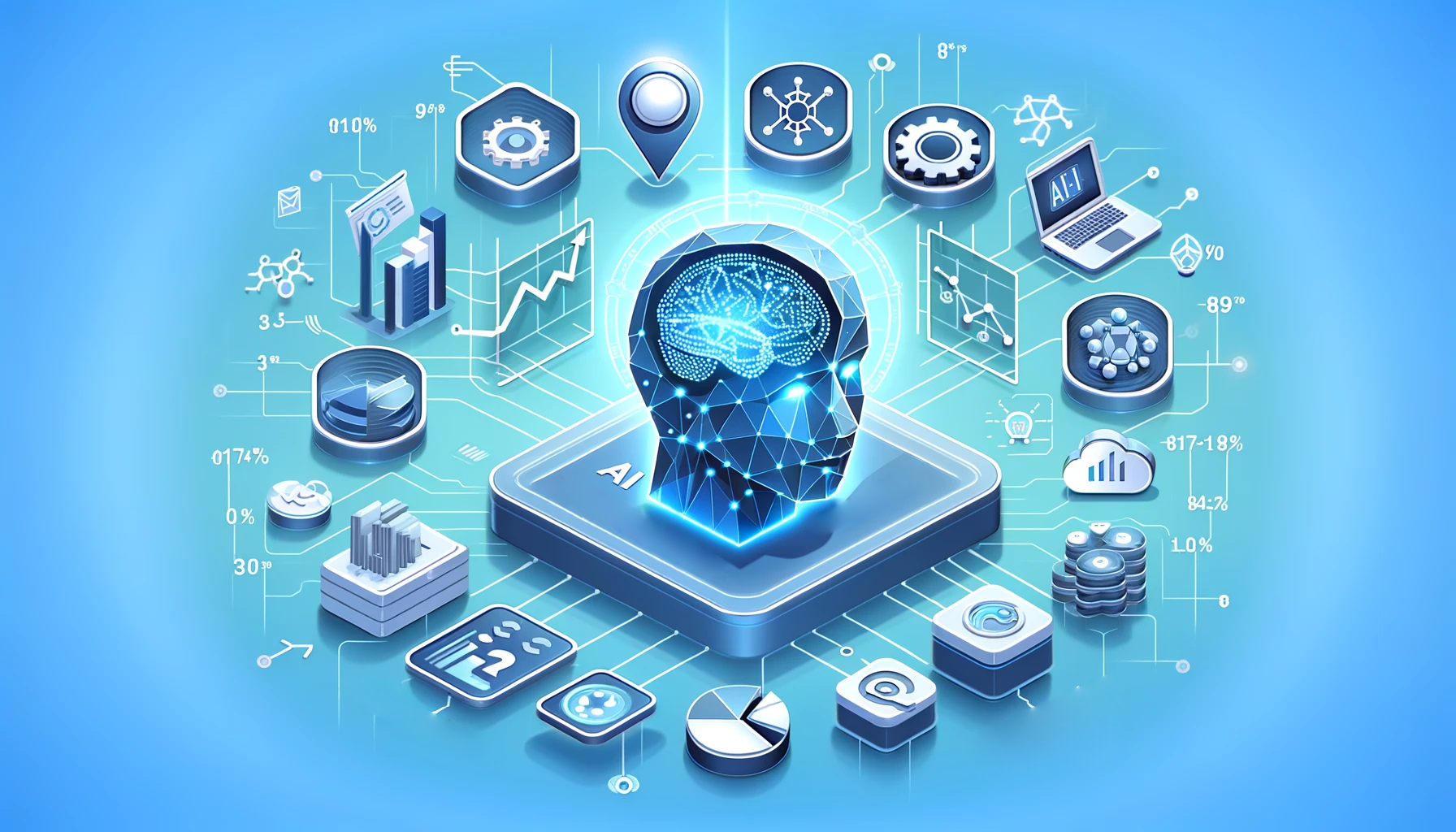
AI Marketing is a valuable tool for personalized marketing
AI Marketing has transcended the concept of a common term to become the most powerful tool in the marketing field today. It plays a vital role in personalizing marketing strategies and enhancing customer experience. AI Marketing is revolutionizing many parts of personalized marketing, from improving voice recognition systems, recommendation systems, pricing strategies to customized Advertising campaigns.
Customer engagement is a key factor, and thanks to AI, we are entering a new era of sophisticated recognition and analytics. This helps create a seamless customer experience and optimize internal workflows, leading to greater efficiency in marketing and customer communication.
AI Marketing Personalized Product Recommendations: A Conversion Booster
AI in personalized product recommendations is like the experience you have when you walk into a store and the salesperson understands exactly what you need, even before you ask. This is the power of AI Marketing-based “next product” recommendation systems, which are fine-tuned to match individual preferences and encourage purchases, thereby driving Sales growth and revenue.
Services like Shopee and Netflix have become the standard in providing personalized recommendations. They apply AI algorithms to analyze large amounts of user data to recommend products and content that match each customer’s preferences, a process known as content personalization. This level of personalization contributes to increased conversion rates and customer loyalty, creating great efficiency in marketing strategies.
AI Marketing in Target Marketing for Pricing and Promotion
AI Marketing today goes beyond just product recommendations and extends to personalized pricing and promotional strategies. In short, AI-based marketing solutions enable the creation of an environment where each customer or user receives unique promotional offers, tailored to their preferences and browsing history. Furthermore, AI ensures that promotional campaigns are not only effective but also targeted, thereby minimizing waste and maximizing ROI.
In other words, AI Marketing is changing the rules of the game when it comes to pricing and promotions, helping businesses deliver hyper-personalized experiences that were previously difficult to achieve. Whether it’s customizing insurance pricing or optimizing retail promotions, the impact of AI is dramatically changing the way businesses interact with customers online.
AI Marketing for Micro-Segmentation and Increasing Ancillary Revenue
In addition to providing product recommendations and enhancing customer experience, AI is also revolutionizing Digital Marketing through techniques like micro-segmentation, which is contributing to a significant increase in ancillary revenue.
Considering the impact of AI Marketing on Digital Marketing, take the travel industry as an example. Travel companies have leveraged AI Marketing to perform micro-segmentation of customers and build detailed profiles for each customer. Using the extensive data, they deploy recommendation algorithms to provide additional services such as booking accommodation or air tickets online.
With AI-powered micro-segmentation, the company has insights into travelers’ preferences, interests, and past behavior. From there, the system recommends personalized options, such as hotels and local transportation, creating a highly customized travel experience for customers. This level of personalization not only enriches the customer journey but also contributes to increased ancillary revenue for the company.
AI in Targeted Marketing for Data Analytics
In today’s data-rich environment, the adoption of AI Marketing and predictive analytics is more important than ever to help drive digital transformation. Thanks to advanced machine learning algorithms, deciphering customer behavior and preferences with high accuracy is no longer a challenge. This not only allows for effective segmentation of target audiences but also aids in predicting future customer behavior, making it an indispensable tool for modern businesses.
Predictive analytics, a key element of AI-driven marketing, provides the ability to predict customer trends and behaviors. By analyzing patterns and data, it provides insights into the next action a customer is likely to take. This capability clearly helps businesses adjust their AI advertising campaigns flexibly and proactively respond to customer needs.
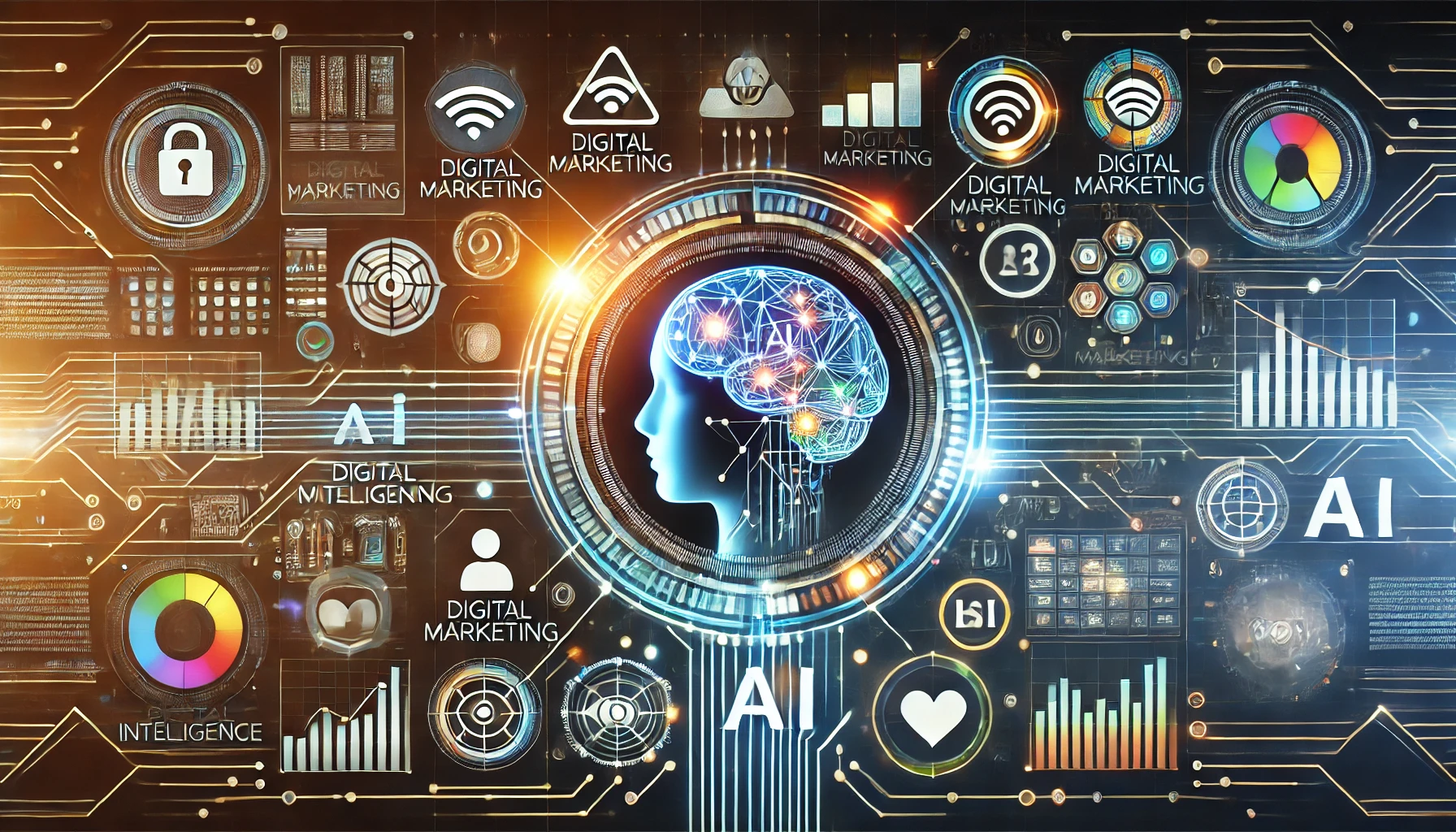
AI in Post-Sale Support
In marketing, the customer journey does not stop after a transaction. With the help of AI, customer service can operate 24/7 to address customer requests. AI Marketing is especially effective in handling and managing a large number of customer inquiries, and quickly adapting to changes in the number of service requests.
AI not only handles simple questions like delivery times or appointment bookings but also has the ability to suggest human intervention when faced with complex issues, when necessary. This level of support ensures that customers remain satisfied, even after the transaction has been completed.
Overall, AI-powered marketing solutions are not limited to a single touchpoint but a continuous process that drives every part of the customer journey, from initial product consideration to post-sale support. With the personalization and 24/7 availability of AI, businesses can create a memorable experience, build lasting customer relationships, and increase efficiency in Digital Marketing.
So How Do You Implement AI Into Your Marketing Strategy?
When starting to integrate AI into your marketing strategy, it is important to follow a structured process to achieve your goals effectively. Before taking these steps, you can refer to our detailed blog post on how to apply AI in marketing.
To effectively implement AI Marketing into your marketing strategy, start by defining the specific goal you want to achieve. It could be increasing sales, generating leads, or increasing website traffic. This goal will guide you through the AI implementation process.
Next, choosing the right AI Marketing tool for your business and goals is crucial. As a Digital Marketing professional, research and choose from a variety of AI tools, not just limited to chatbots or lead generation, but also consider AI Marketing automation and optimization features.
Then, integrate AI Marketing seamlessly into your existing workflow. This may require you to make adjustments to your systems and workflows to ensure a smooth integration. Also, train your AI tools with your specific data for best results.
Finally, partner with AI Marketing experts, especially if you are just starting out or have little experience in the industry. These experts will provide you with in-depth knowledge and help you effectively leverage the potential of targeted marketing and predictive analytics, ensuring your marketing strategy is optimized in a sophisticated way.
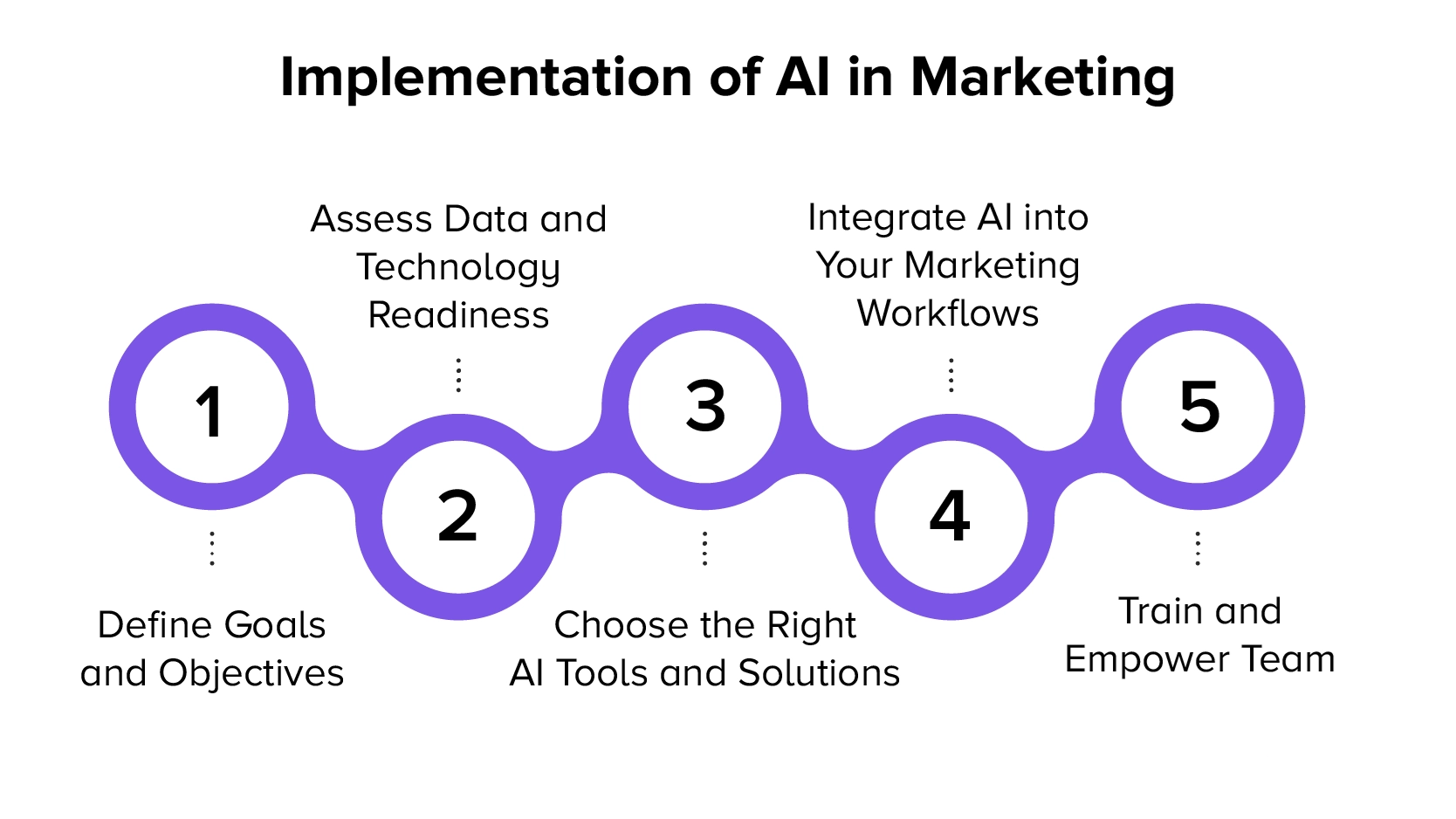
AI Marketing Tools
Popular AI Tools and Platforms
There is no shortage of AI tools and platforms available to marketers, each offering unique features and capabilities. Some popular options include:
- Google Analytics: A robust analytics platform that provides insights into website traffic and user behavior.
- HubSpot: An all-in-one marketing platform that offers a range of AI-powered tools for marketing automation, lead generation, and customer relationship management.
- Salesforce Einstein: An AI-powered CRM platform that provides insights into customer behavior and automates routine tasks.
- Chatbots like Drift and Intercom: These platforms offer AI-powered chatbots that can handle customer inquiries and provide instant support.
Choosing the Right AI Tools for Your Business
When selecting AI tools for your business, it’s important to consider your specific needs and goals. Factors to consider include:
- Budget: Determine how much you’re willing to invest in AI tools and platforms.
- Features: Identify the features and capabilities that are most important to your business.
- Integration: Ensure that the tools you choose can integrate seamlessly with your existing systems and processes.
- Scalability: Consider whether the tools can scale with your business as it grows.
Implementing AI in Your Marketing
Steps to Integrate AI into Your Marketing Strategy
Integrating AI into marketing requires a strategic approach. Marketers need to identify the areas where AI can add the most value, select the right tools and technologies, and ensure that their teams are trained to use these tools effectively. It’s also important to have a clear plan for data management and analysis. Here are some steps to guide you:
- Identify Your Goals: Determine what you hope to achieve with AI Marketing, whether it’s improving customer engagement, increasing conversions, or optimizing your marketing efforts.
- Assess Your Data: Evaluate the data you currently have and identify any gaps or areas for improvement.
- Choose the Right Tools: Select AI tools and platforms that align with your goals and needs.
- Train Your Team: Ensure that your team is equipped with the knowledge and skills needed to effectively use AI tools and technologies.
- Monitor and Optimize: Continuously monitor the performance of your AI-driven marketing efforts and make adjustments as needed.
Overcoming Challenges in AI Marketing Implementation
While AI offers many benefits, it also comes with challenges. These include data privacy concerns, the need for significant investment, and the complexity of AI technologies. Marketers need to address these challenges by implementing robust data security measures, securing buy-in from stakeholders, and investing in training and development. Some common obstacles include:
- Data Quality: Ensuring that your data is accurate, complete, and up-to-date is crucial for effective AI Marketing.
- Integration: Integrating AI tools and platforms with existing systems can be complex and time-consuming.
- Training: Ensuring that your team is equipped with the knowledge and skills needed to effectively use AI tools and technologies.
- Ethical Considerations: Navigating the ethical implications of AI Marketing, such as data privacy and algorithmic bias.
AI in Content Marketing
Content Creation and Curation: AI can assist in content creation by generating ideas, writing articles, and even creating visual content. It can also help in content curation by analyzing user preferences and recommending relevant content. This ensures that the content is always fresh, engaging, and tailored to the audience’s interests.
Content Personalization: Personalized content is more likely to resonate with the audience and drive engagement. AI can analyze user data to create personalized content that meets the specific needs and preferences of each user. This can include personalized emails, blog posts, and social media content.
AI-Driven SEO: Search engine optimization (SEO) is crucial for online visibility, and AI can enhance SEO efforts. AI tools can analyze search trends, identify relevant keywords, and optimize content for search engines. This helps in improving search rankings and driving more organic traffic to the website.
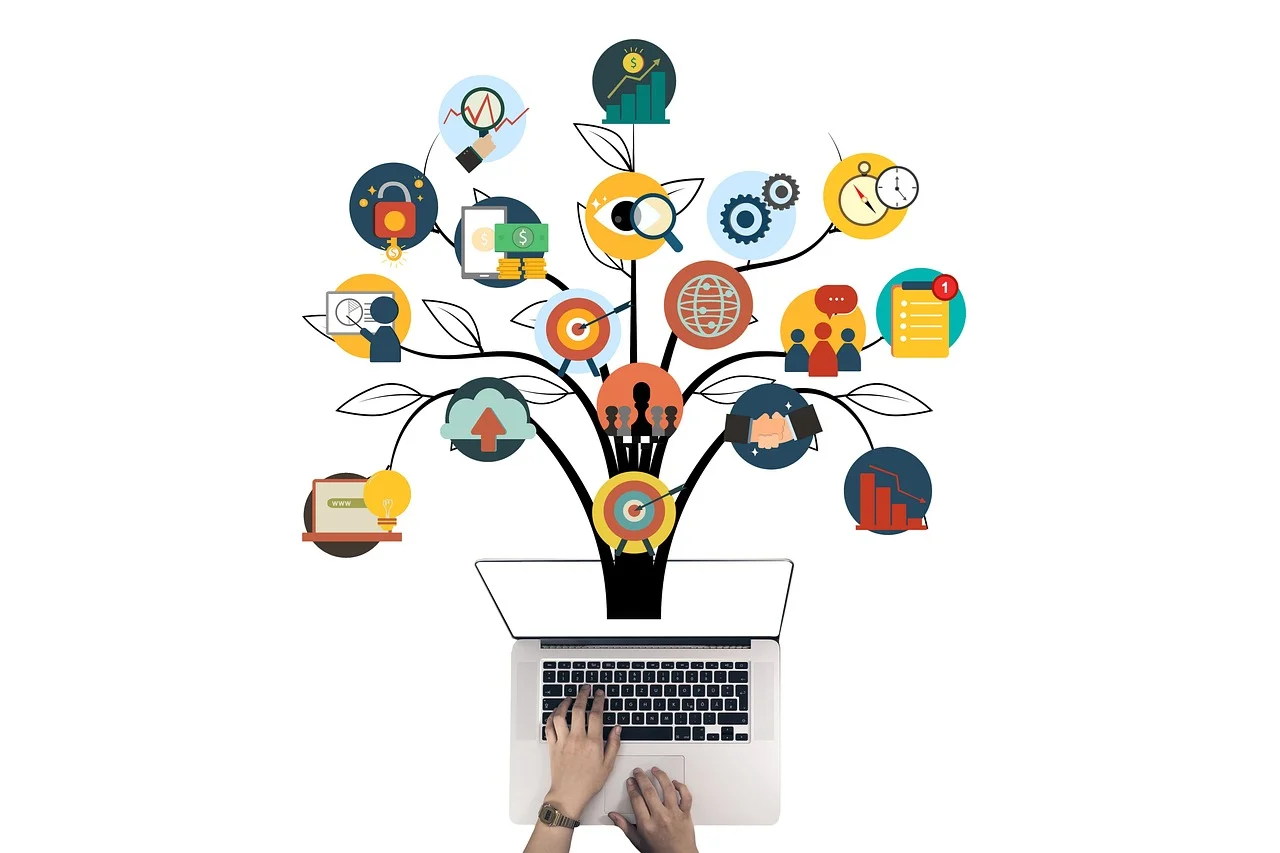
AI in Social Media Marketing
Social Media Analytics: AI-powered social media analytics tools can provide valuable insights into audience behavior, engagement metrics, and campaign performance. These tools can analyze data from various social media platforms to help marketers understand what works and what doesn’t, allowing them to optimize their strategies.
Automated Social Media Management: Managing social media accounts can be time-consuming, but AI can automate many of these tasks. AI tools can schedule posts, respond to comments, and even create content. This not only saves time but also ensures that the social media presence is consistent and engaging.
Influencer Marketing with AI: Influencer marketing is a popular strategy, and AI can enhance its effectiveness. AI tools can identify the right influencers for a brand, analyze their audience, and measure the impact of influencer campaigns. This ensures that the brand collaborates with influencers who can deliver the best results.
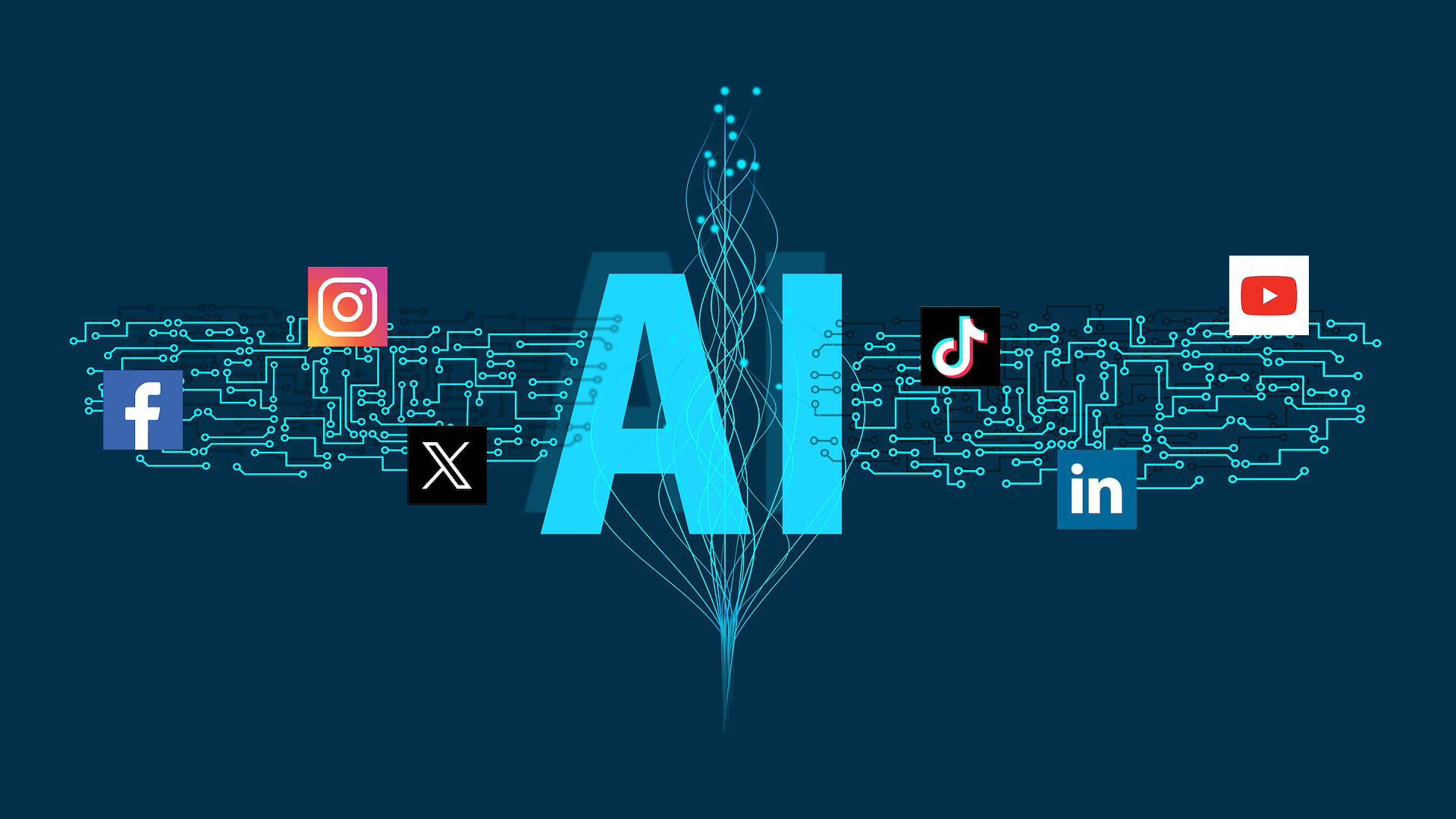
AI in Email Marketing
Automated Email Campaigns: AI can automate email marketing campaigns, from creating personalized email content to scheduling and sending emails. This ensures that the emails are timely, relevant, and engaging, leading to higher open and click-through rates.
Personalization and Segmentation: AI can analyze customer data to segment email lists and create personalized email content. This ensures that the right message reaches the right audience, leading to higher engagement and conversion rates.
Predictive Email Marketing: Predictive analytics can be used in email marketing to forecast customer behavior and optimize email campaigns. This includes predicting the best time to send emails, identifying the most engaging content, and targeting the most promising leads.
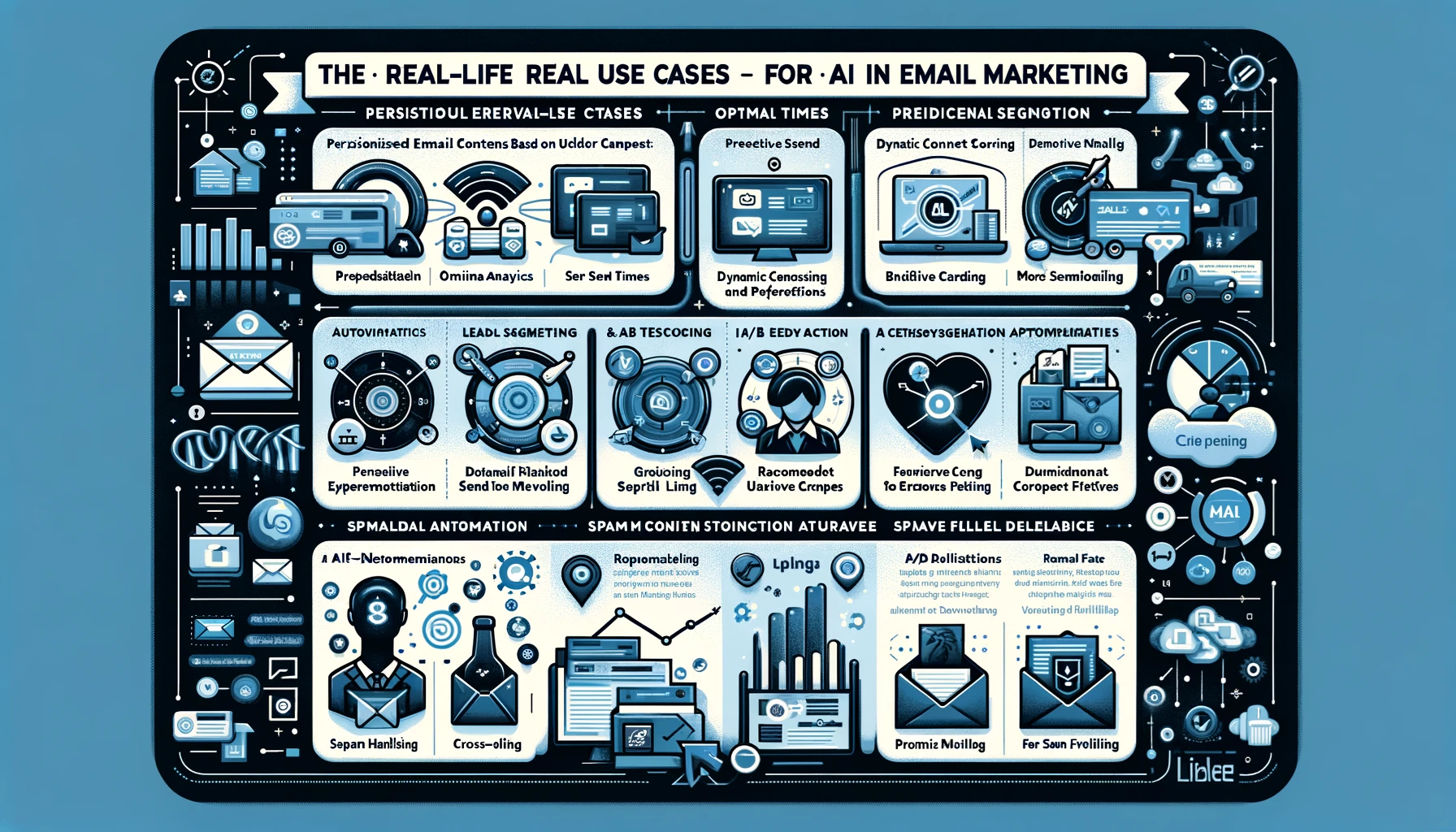
AI in Advertising
Programmatic Advertising: Programmatic advertising uses AI to automate the buying and selling of ad space. This ensures that ads are shown to the right audience at the right time, leading to higher engagement and conversion rates. AI can also optimize ad placements and budgets in real-time.
Ad Targeting and Optimization: AI can analyze user data to create highly targeted ad campaigns. This includes identifying the right audience, creating personalized ad content, and optimizing ad placements. This ensures that the ads are relevant and engaging, leading to higher conversion rates.
AI-Powered Ad Creatives: AI can also play a significant role in creating ad content. By analyzing data on what types of ads perform best, AI can generate ad creatives that are more likely to engage the target audience. This includes everything from the design and layout to the copy and call-to-action. AI can even test different versions of ads to determine which ones are most effective.

AI in Customer Relationship Management (CRM)
AI-Enhanced CRM Systems: Customer Relationship Management (CRM) systems are essential for managing customer interactions and data. AI can enhance these systems by providing deeper insights into customer behavior, automating routine tasks, and predicting future customer needs. This allows businesses to build stronger relationships with their customers and improve customer satisfaction.
Predictive Customer Service: AI can predict customer issues before they arise, allowing businesses to address them proactively. This includes identifying potential problems based on past behavior and providing personalized solutions. Predictive customer service can lead to higher customer satisfaction and loyalty.
Customer Retention Strategies: Retaining customers is just as important as acquiring new ones, and AI can help with this. By analyzing customer data, AI can identify at-risk customers and suggest strategies to retain them. This includes personalized offers, targeted communication, and proactive customer service.

Ethical Considerations in AI Marketing
Data Privacy and Security: With the increasing use of AI in marketing, data privacy and security have become major concerns. Marketers must ensure that they are collecting and using customer data responsibly. This includes complying with data protection regulations, such as GDPR, and implementing robust security measures to protect customer data.
Transparency and Accountability: Transparency and accountability are crucial in AI Marketing. Businesses must be transparent about how they are using AI and ensure that their AI systems are making fair and unbiased decisions. This includes regularly auditing AI systems and being accountable for any decisions made by AI.
Ethical AI Practices: Ethical AI practices involve using AI in a way that is fair, transparent, and respectful of customer privacy. This includes avoiding biased algorithms, ensuring that AI decisions are explainable, and respecting customer consent. Ethical AI practices can build trust with customers and enhance the reputation of the business.
Future of AI Marketing
Trends Shaping the Future of Marketing with AI
The future of AI Marketing is bright, with numerous trends shaping its trajectory. Some key trends to watch include:
- Increased Personalization: As AI technologies continue to advance, marketers will be able to deliver even more personalized and relevant experiences to their audiences.
- Enhanced Customer Engagement: AI-powered tools will enable businesses to engage with customers in new and innovative ways, fostering deeper connections and driving brand loyalty.
- Greater Automation: Automation will continue to play a significant role in AI Marketing, enabling marketers to streamline their efforts and focus on strategic and creative initiatives.
Ethical Considerations in AI Marketing
As AI continues to permeate the marketing landscape, ethical considerations have become increasingly important. Marketers must navigate a complex web of ethical issues, ensuring that their AI-driven efforts align with ethical standards and societal norms. Key considerations include:
- Data Privacy: With access to vast amounts of consumer data, marketers must prioritize data privacy and protection, adhering to regulations like GDPR and ensuring transparent data collection practices.
- Algorithmic Bias: AI algorithms can inadvertently perpetuate biases present in the data they are trained on. It’s essential for marketers to regularly audit their AI systems to ensure fairness and prevent discrimination.
- Transparency: Consumers are increasingly demanding transparency in how their data is used. Marketers must clearly communicate how AI technologies are employed and how consumer data is utilized to build trust.
The Role of AI in Global Marketing Strategies
AI is not only transforming local marketing efforts but also revolutionizing global marketing strategies. By providing insights into diverse consumer behaviors and preferences across different regions, AI enables marketers to tailor their strategies to resonate with global audiences. This global reach allows businesses to expand their brand presence and tap into new markets with precision and efficiency.
AI and Augmented Reality (AR): The combination of AI and Augmented Reality (AR) is set to revolutionize marketing. AI can enhance AR experiences by providing real-time data and insights, creating more immersive and personalized experiences. This includes everything from virtual try-ons to interactive product demonstrations.
Voice Search and AI: Voice search is becoming increasingly popular, and AI is at the forefront of this trend. AI can optimize content for voice search, ensuring that it is easily discoverable by voice assistants like Siri and Alexa. This includes using natural language processing to understand and respond to voice queries.
The Future of AI in Marketing: The future of AI in marketing is bright, with new technologies and applications emerging all the time. From advanced analytics and personalization to automated content creation and customer service, AI is set to transform every aspect of marketing. Businesses that embrace AI will be well-positioned to stay ahead of the competition and deliver exceptional customer experiences.
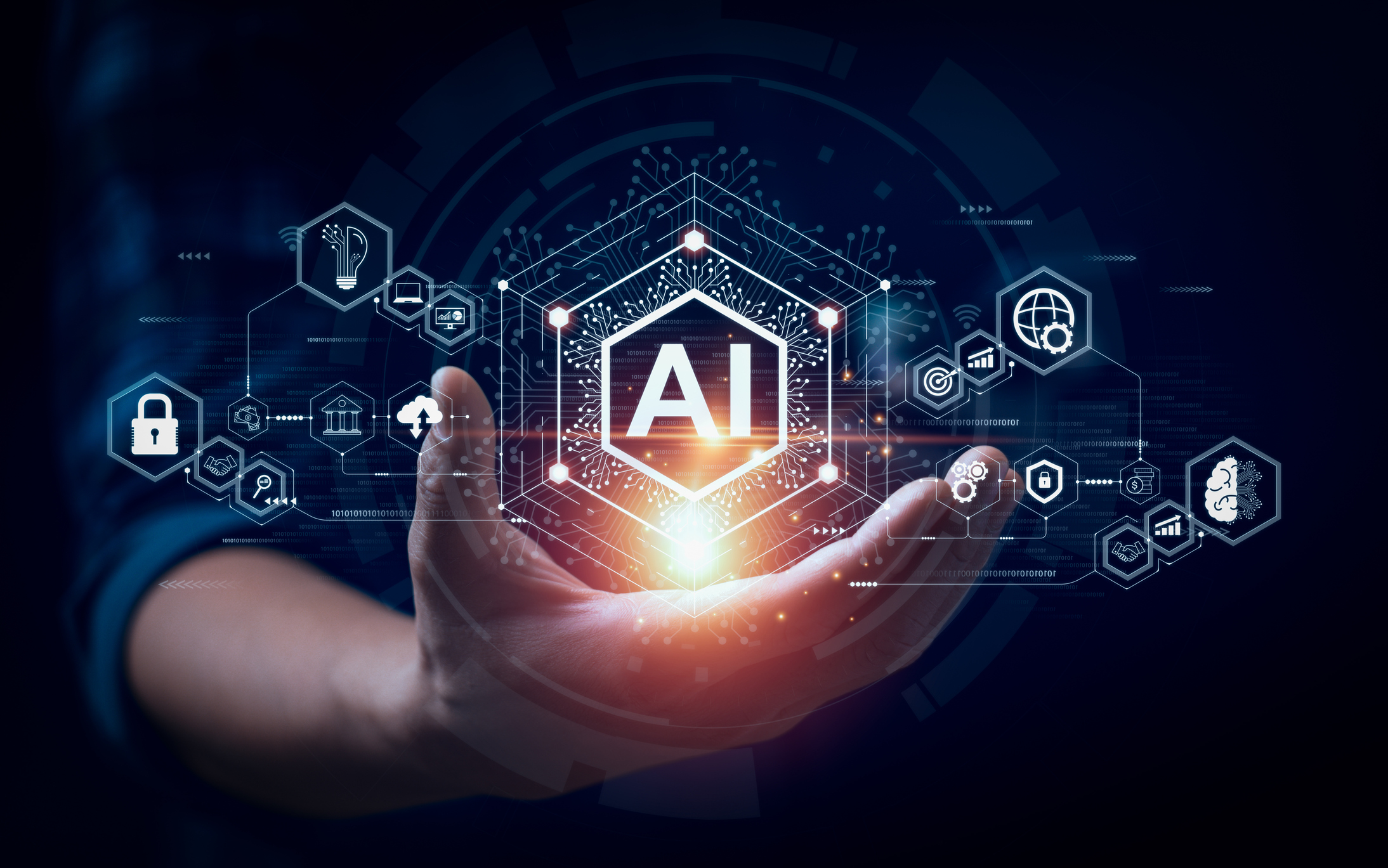
Case Studies
Successful AI Marketing Campaigns
Numerous brands have successfully harnessed AI Marketing to drive remarkable results. For example, Netflix leverages AI to deliver personalized content recommendations, significantly increasing user engagement and retention. Similarly, Coca-Cola uses AI to analyze consumer sentiment on social media, enabling the brand to tailor its marketing messages and campaigns in real-time.
Lessons Learned from AI Marketing Failures
While there are many success stories, there are also valuable lessons to be learned from AI Marketing failures. For instance, Microsoft’s AI chatbot, Tay, was quickly taken offline after it began posting inappropriate content due to insufficient control over its learning process. This highlights the importance of robust oversight and monitoring in AI implementations to prevent negative outcomes.
Conclusion
In conclusion, AI Marketing is not just a buzzword but a transformative force reshaping the marketing landscape. By leveraging the power of AI, businesses can deliver personalized experiences, make data-driven decisions, and stay ahead of the competition. While challenges and ethical considerations exist, the potential benefits of AI Marketing far outweigh the risks. As technology continues to evolve, marketers must embrace AI as an integral part of their strategies to thrive in the digital age. With the right approach, AI Marketing can unlock new opportunities and drive tangible results for businesses of all sizes.
FAQs
What is AI Marketing?
AI Marketing involves using artificial intelligence technologies to automate and enhance marketing efforts, allowing for more efficient and effective engagement with consumers.
How does AI Marketing benefit businesses?
AI Marketing offers numerous benefits, including improved personalization, enhanced customer insights, increased efficiency through automation, and the ability to make data-driven decisions.
What are some popular AI Marketing tools?
Some popular AI Marketing tools include Google Analytics, HubSpot, Salesforce Einstein, and AI-powered chatbots like Drift and Intercom.
How can businesses integrate AI into their marketing strategies?
Businesses can integrate AI into their marketing strategies by identifying their goals, assessing their data, choosing the right tools, training their team, and continuously monitoring and optimizing their efforts.
What are the ethical considerations in AI Marketing?
Ethical considerations in AI Marketing include data privacy, algorithmic bias, and transparency. Marketers must ensure their AI-driven efforts align with ethical standards and societal norms.
What trends are shaping the future of AI Marketing?
Key trends shaping the future of AI Marketing include increased personalization, enhanced customer engagement, and greater automation.
How does AI improve marketing efficiency?
AI improves marketing efficiency by automating repetitive tasks, such as email marketing and social media posting, allowing marketers to focus on more strategic tasks.
What are the benefits of AI in content marketing?
AI can assist in content creation, curation, and personalization, ensuring that the content is always fresh, engaging, and tailored to the audience’s interests.
How can AI enhance customer relationship management (CRM)?
AI can enhance CRM systems by providing deeper insights into customer behavior, automating routine tasks, and predicting future customer needs, leading to stronger customer relationships.
What are the ethical considerations in AI Marketing?
Ethical considerations in AI Marketing include data privacy and security, transparency and accountability, and ensuring that AI systems are making fair and unbiased decisions.
What are the future trends in AI Marketing?
Future trends in AI Marketing include the combination of AI and Augmented Reality (AR), optimization for voice search, and the continued emergence of new AI technologies and applications.
Comment Policy: We truly value your comments and appreciate the time you take to share your thoughts and feedback with us.
Note: Comments that are identified as spam or purely promotional will be removed.
To enhance your commenting experience, consider creating a Gravatar account. By adding an avatar and using the same e-mail here, your comments will feature a unique and recognizable avatar, making it easier for other members to identify you.
Please use a valid e-mail address so you can receive notifications when your comments receive replies.
